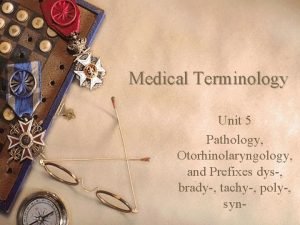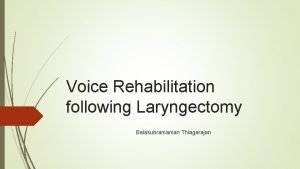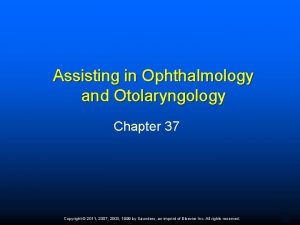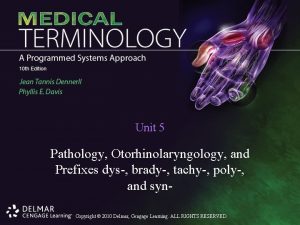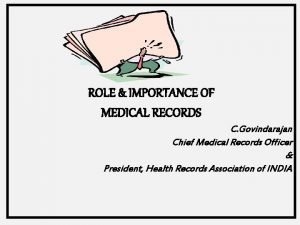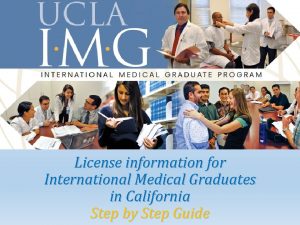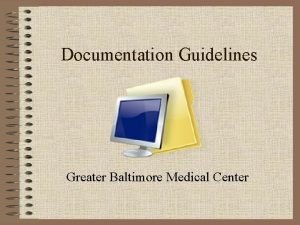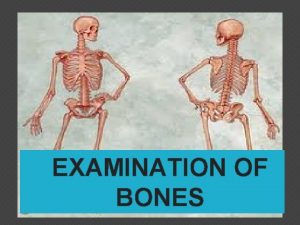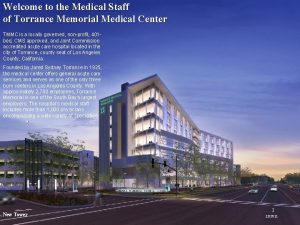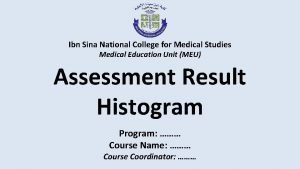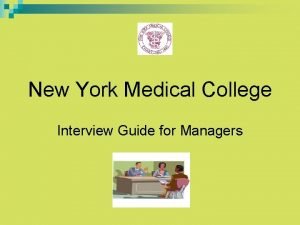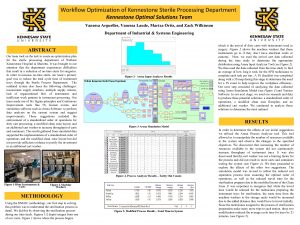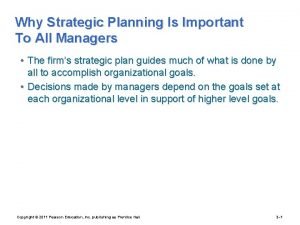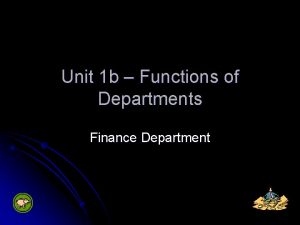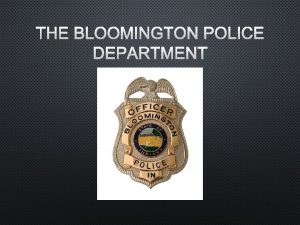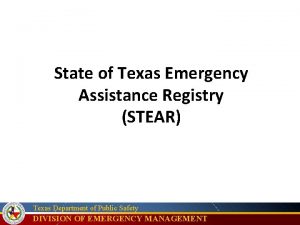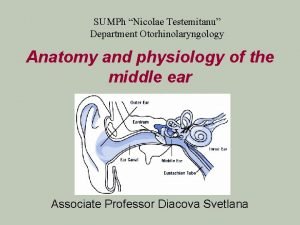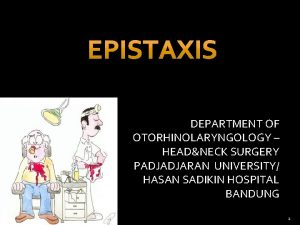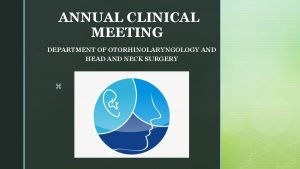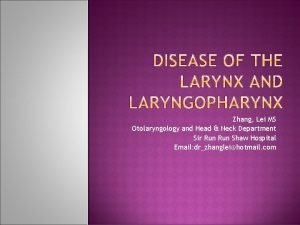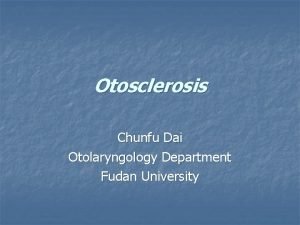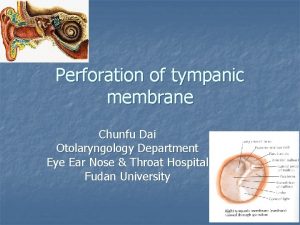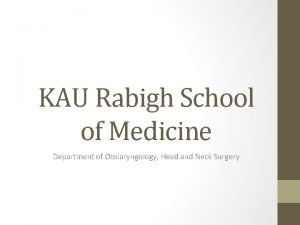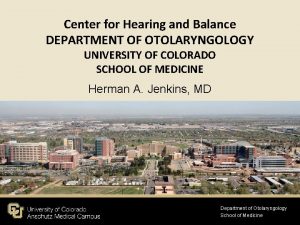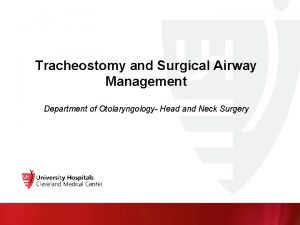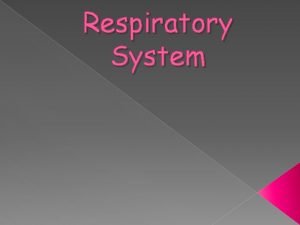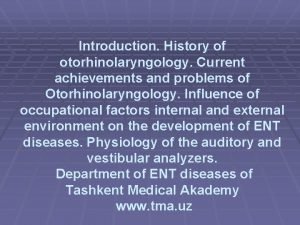OTOLARYNGOLOGY DEPARTMENT OF OTORHINOLARYNGOLOGY OF LIAONING MEDICAL COLLEGE














































- Slides: 46

OTOLARYNGOLOGY DEPARTMENT OF OTORHINOLARYNGOLOGY OF LIAONING MEDICAL COLLEGE CHEN DONG

Good morning everybody

Rhinolog y

Anatomy of Nose • External nose • Nasal cavity • paranasal sinuses

The external nose • The external nose is triangular-shaped projection in the center of the face, consists of osteocartilaginous framework covered by muscles and skin.

The external nose Landmark Root of nose Nasal dorsum Nasal bridge Nasolabial fold Alae nasi Nasal apex Anterior naris (nostril) columella

The external nose Framework(cartilaginous)

The external nose Framework(bony) frontal processes of the maxilla. Nasal bone pyriform aperture

BONE AND CARTILAGE OF NOSE

Nasal bone fractures are prevalent in sport, particularly in collision and contact sports.

DANGER TRIANGLE OF THE FACE Due to the special nature of the blood supply to the human nose and surrounding area, it is possible for retrograde infections from the nasal area to spread to the brain. For this reason, the area from the corners of the mouth to the region between the eyes, including the nose and maxilla, is known to doctors as the danger triangle of the face.

Vein of external nose Cavernous sinus Superior & inferior ophthalmic v. Facial v.

cavernous sinus

Nasal cavity • Nasal vestibule is the anterior and inferior part of nasal cavity. It is lined by skin and contains sebaceous glands, hair follicles and hair(vibrissae) easy to infection. • Nasal cavity proper Furuncle of nasal vestibule

Nasal cavity proper • The roof. Anterior sloping part of the roof is formed by nasal bones; Posterior sloping part by the body of sphenoid bone; and the middle horizontal part, by the cribriform plate of ethmoid.

Nasal cavity proper • The floor of the nose is formed by the palatal process of the maxilla and the horizontal process of the palate bones.

Nasal cavity proper • Medial wall. Nasal septum. vomer

STRCTURE OF NASAL SEPTUM

Septum deviation Result in- • Nasal obstruction • Nasal bleeding • Headache • Anosmia • Sinusitis • External deformity

Nasal cavity proper • Laterior wall. The lateral wall is marked by three scroll-like bone projections called turbinates or conchae. Below and lateral to each turbinate is the corresponding meatus.


Laterior wall of nasal cavity

Nasal cavity proper Laterior wall. l. Nasolacrimal duct opens in the anterior part of inferior meatus. l. The anterior group of sinuses (frontal, marxillary and anterior ethmoidal sinuses) open to the infundibulum in middle meatus. l. Posterior ethmoidal sinuses open into superior meatus. l. The openning of sphenoid sinus situate is phenoethmoidal recess lies above the superior turbinate.

Posterior naris (choanae) Nasal septum Inferior turbinate

Inferior turbinate

middle turbinate

rhinosinusitis

Ostiomeatal complex The ostiomeatal complex is the sinus "hot spot, " one of the most important anatomical regions with regard to sinus health and disease. That comprises maxillary sinus ostia, anterior ethmoid cells and their ostia, ethmoid infundibulum, hiatus semilunaris, and middle meatus.

Nasal cavities: Microanatomy Mucosal lining • Respiratory epithelium – – columnar goblet cells mucus blanket cilia • Olfactory epithelium – Small area near roof ciliated pseudostratified columnar epithelium

Nerve innervation of the nose • Olfactory nerves (cranial nerve I) • Trigeminal nerve (cranial nerve V) • Parasympathetics • Sympathetics

Blood supply of nasal cavity anterior ethmoidal a. posterior ethmoidal a. sphenopalatine a. iternal maxillary a. great palatine a.


Little plexus

paranasal sinuses The sinuses are air-filled bony cavities located in the face and skull adjacent to the nose.

paranasal sinuses • • Maxillary sinus Ethmoid sinus Frontal sinus Sphenoid sinus

Maxillary sinus The maxillary sinus is the largest one, present in the maxilla bone either side of nose and below the eyes. The sinus drains into the nasal cavity through its ostium that is situated in the middle meatus.

maxillary bone

maxillary bone

Ethmoid sinus This sinus comprises a group of air cells, which form one of the most complex structures in the body. Hence the sinus is rightly named the ethmoid ‘labyrinth’.

n ethmoid bone

Frontal sinus The frontal sinuses are situated beneath the bone of the forehead and just in front of the bone overlying the brain. And drains through the frontal recess to the middle meatus.

Sphenoid sinus The sphenoid sinuses are deep within the skull behind the ethmoid sinuses. The sinus opens in the upper part of anterior wall and drains into the sphenoethmoidal recess.

Sphenoid bone

sphenoid

sphenoid

 Liaoning medical university
Liaoning medical university Dipsia medical term
Dipsia medical term Panje prosthesis
Panje prosthesis Chapter 31 ophthalmology and otolaryngology
Chapter 31 ophthalmology and otolaryngology Dr jennifer a. baima
Dr jennifer a. baima Brady prefix
Brady prefix History suffix
History suffix Give 3 words each that is associated with parts
Give 3 words each that is associated with parts Importance of medical records department
Importance of medical records department Medical education and drugs department
Medical education and drugs department Pasadena city college police department
Pasadena city college police department California medical license application
California medical license application Gbmc medical records
Gbmc medical records Hepburn osteometric board
Hepburn osteometric board Torrance memorial transitional care unit
Torrance memorial transitional care unit Cartersville medical center medical records
Cartersville medical center medical records Abu ali sina university peshawar
Abu ali sina university peshawar New york medical college interview
New york medical college interview Hawler medical university college of nursing
Hawler medical university college of nursing Hawler medical university college of nursing
Hawler medical university college of nursing Wake tech admissions
Wake tech admissions Early college high school at midland college
Early college high school at midland college Sterile workflow optimization
Sterile workflow optimization Why strategic planning is important to all managers
Why strategic planning is important to all managers Uta math
Uta math Swot analysis for procurement department
Swot analysis for procurement department Objectives of warehouse
Objectives of warehouse Wakulla county rec park
Wakulla county rec park Amar telidji university
Amar telidji university Undss logo
Undss logo Finance department
Finance department Computer science ucl
Computer science ucl Department of energy inspector general
Department of energy inspector general Tiffany taylor georgia department of education
Tiffany taylor georgia department of education The diagnostic role of marketing research includes
The diagnostic role of marketing research includes Steps in operational planning
Steps in operational planning Bloomington indiana police department
Bloomington indiana police department Tsdps rainfall integration
Tsdps rainfall integration Fire department succession planning
Fire department succession planning Rebecca corrigan olmsted falls
Rebecca corrigan olmsted falls Stewarding department
Stewarding department Nyc department of environmental protection
Nyc department of environmental protection State of texas emergency assistance registry
State of texas emergency assistance registry Nevada department of business and industry
Nevada department of business and industry National risk ambulance
National risk ambulance Ramsdis
Ramsdis San luis obispo county building department
San luis obispo county building department

